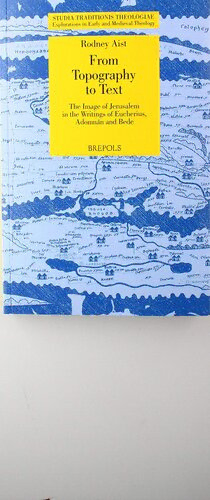
From Topography to Text: The Image of Jerusalem in the Writings of Eucherius, Adomnan and Bede (Studia Traditionis Theologiae) (Studia Traditionis ... ikn Early and Medieval Theology, 30) PDF
288 Pages·2019·2.133 MB·English
Most books are stored in the elastic cloud where traffic is expensive. For this reason, we have a limit on daily download.
Preview From Topography to Text: The Image of Jerusalem in the Writings of Eucherius, Adomnan and Bede (Studia Traditionis Theologiae) (Studia Traditionis ... ikn Early and Medieval Theology, 30)
Description:
From Topography to Text: The Image of Jerusalem in the Writings of Eucherius, Adomnan and Bede uses topographical detail to examine the source material, religious imagination and the image of Jerusalem in three related Latin texts from the fifth, seventh and eighth centuries. The work introduces an original methodology for analyzing the Jerusalem pilgrim texts, defined by their core interest in the commemorative topography of the Christian holy places. By newly identifying the topographical material in Adomnan's description of Jerusalem, the study exposes key distortions in the text, its exclusive intramural focus on the Holy Sepulchre and the eschatological image of New Jerusalem that emerges from its description of contemporary Jerusalem. The study verifies the post-Byzantine provenance of Adomnan's topographical material, namely, the oral report of Arculf, thus, redressing scholarly ambivalence regarding Adomnan's contemporary source. The new insights into Adomnan's De locis sanctis, including its mental map of Jerusalem, provides a template with which to analyze the text's relationship with the writings of Eucherius and Bede. While Bede's De locis sanctis has commonly been regarded as an epitome of Adomnan's work, when the sequence, structure and images of the texts are compared, Eucherius not Adomnan is, for Bede, the authoritative text. From Topography to Text offers a significant discussion on the Jerusalem pilgrim texts and the Christian topography of the Holy City, while analyzing the image of Jerusalem in the writings of three remote authors who never set foot in the city.
See more
The list of books you might like
Most books are stored in the elastic cloud where traffic is expensive. For this reason, we have a limit on daily download.
